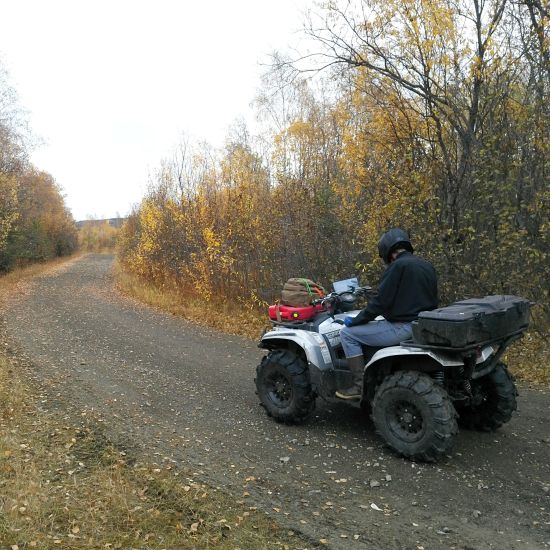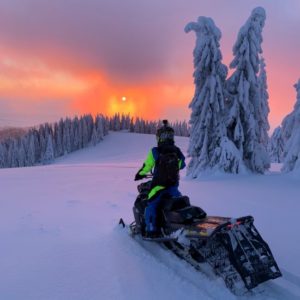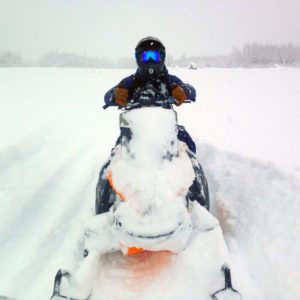Permit – Non-Commercial Recreation, Daily
$10.00
A Non-Commercial Recreation permit for individual personal use of off-road motorized vehicles, landing of private aircraft, and individual overnight camps limited to 14 consecutive days (please review Terms & Conditions below before placing order).
Description
Daily, Non-Commercial Recreation means individual personal use of off-road motorized vehicles, landing of private aircraft, and individual overnight camps limited to 14 consecutive days, and includes the following activities limited by the purchased permit duration:
- “using a recreational-type off-road or all-terrain vehicle with a curb weight of up to 1,500 pounds, including a snowmobile and four-wheeler, on established roads or ATV trails. If use off the established road or trails there must be sufficient snow depth in place so as not to cause ground disturbance or thermal erosion;”
- “landing of private aircraft, for noncommercial purposes, on wheels, floats, or skis. Landings must either be at a developed airstrip, on a lake, or there must be sufficient snow depth in place so as not to cause ground disturbance or thermal erosion.”
- “setting up and using a camp for personal, noncommercial purposes, for no more than 14 days at one site, using a tent platform or other temporary structure that can readily be dismantled and removed; the entire camp must be moved at least two miles before the end of the 14-day period; a cabin or other permanent improvement is not allowed, even if on skids or another nonpermanent foundation; the camp must be removed immediately if the Trust Land Office determines that it interferes with Trust access or other Trust uses or interests;” and
- “use of dead and down timber may be used for personal use at the camp site. Timber less than six inches in diameter, brush, and slash shall be disposed of to minimize the risk of fire and disease in accordance with the laws, regulations and guidelines established by the State of Alaska, Department of Natural Resources, Division of Forestry”
Terms & Conditions
Pursuant to AS 38.05.801 and 11 AAC 99, the Trust Land Office has determined that the Best Interest of the Trust and its Beneficiaries would be served through issuing a General Permit authorizing certain activities described below to take place on the Trust land described below. All activities shall be conducted in accordance with the following terms and conditions:
- Term: This Permit is revocable at the will of the TLO, non-exclusive, and valid from the date of issuance for the consecutive duration listed above and may not be renewed or extended. The Permittee must have a copy of this permit on their person or posted in any camp while the permittee is using Trust land.
- Authorized Use Area: This authorization pertains only to Alaska Mental Health Trust owned land.
- Reservation of Rights: The Trust reserves the right to grant additional authorizations to third parties for compatible uses on or adjacent to the land covered under this authorization. Authorized concurrent users of Trust land, their agents, employees, contractors, subcontractors and licensees shall not interfere with the operation or maintenance activities of any authorized user.
- Valid Existing Rights: This authorization is subject to all valid existing rights in and to the land covered under this authorization. TLO makes no representations or warranties, whatsoever, either expressed or implied, as to the existence, number or nature of such valid existing rights.
- Statutes and Regulations: Permittee shall, at its expense, comply with all applicable laws, regulations, rules and orders, and the requirements and stipulations included in this authorization. Permittee shall inform and ensure compliance by its employees, agents, contractors, subcontractors, licensees, or invitees. The issuance of this authorization does not alleviate the necessity of the Permittee to obtain authorizations required by other agencies for this activity.
- Indemnification: The Permittee shall defend, indemnify, and hold harmless the State of Alaska, Department of Natural Resources, the Mental Health Trust Land Office, the Alaska Mental Health Trust Authority, and their respective officers, directors, employees, agents, successors, and assigns from any claim or liability arising from or in connection with any act or omission under this Permit, including claims or liabilities for loss or damage to property or injury to any person or release or discharge of any hazardous substance.
- Insurance: Without limiting the Permittee’s indemnification obligation, the Grantee shall purchase, at its own expense, and maintain in force at all times during the term of this Permit an insurance policy to protect both the permittee and the permittor (the State, its officers, agents, and employees).
- Assignment. This authorization is not assignable.
- Change of Address. The permitee shall maintain current contact information with the TLO. Any change of address or phone number must be submitted to the TLO in writing.
- Preference Right: No preference right for long term use or conveyance of the land is granted or implied by the issuance of this authorization.
- Fire Prevention, Protection, and Liability: The Permittee shall take all reasonable precautions to prevent and all reasonable actions to suppress forest, brush and grass fires using best practices. TLO is not liable for damage to the Permittee’s personal property and is not responsible for forest fire protection for the Permittee’s activity.
- Fuel Storage: The total combined fuel stored shall not exceed 55 gallons. All containers must be clearly marked with the contents and the permittee’s name. The permittee is responsible for preventing spills and contamination of contiguous land and water as well as cleaning up any oil or other pollutants that result from activities associated with this permit. Drip pans and absorbent pads must be available to contain and clean up spills from any transfer or handling of fuel.
- Hazardous Substances: The use and storage of hazardous substances by Permittee must be done in accordance with existing federal, state and local laws, regulations and ordinances. Debris (such as soil) contaminated with used motor oil, solvents, or other chemicals may be classified as a hazardous substance and must be recovered from the site and managed and disposed of in accordance with existing federal, state, and local laws, regulations, and ordinances. Should any unlawful discharge, leakage, spillage, emission, or pollution of any type occur due to the Permittee’s, or its employees’, agents’, contractors’, subcontractors’, licensees’, or invitees’ act or omission, the Permittee, at its expense shall be obligated to clean the area to standards prescribed by state and federal law.
- Spill Notification: The Permittee shall immediately notify the Alaska Department of Environmental Conservation (DEC) Spill Response Center at 1-800-478-9300 and TLO at (907) 269-8658 of any unauthorized discharges of oil to water, any discharge of hazardous substances (other than oil), and any discharge of oil greater than 55 gallons solely to land and outside an impermeable revetment. If a discharge of oil is greater than 10 gallons but less than 55 gallons, it must be reported within 48 hours by phone. If a discharge is less than 10 gallons, it may be reported in writing on a monthly basis.
- Alaska Historic Preservation Act: The Alaska Historic Preservation Act (AS 41.35.200) prohibits the appropriation, excavation, removal, injury, or destruction of any state-owned historic, prehistoric (paleontological) or archaeological site without authorization from the commissioner. Should any sites be discovered during the course of operations under this Permit, activities that may damage the site will cease and the Office of History and Archaeology in the Division of Parks and Outdoor Recreation (907) 269-8721 shall be notified immediately.
- Site Disturbance: Site disturbance shall be kept to a minimum amount of ground necessary to protect local habitats. All activities shall be conducted in a manner that will minimize the disturbance of soil and vegetation and changes in the character of natural drainage systems. Particular attention must be paid to prevent pollution and siltation of streams, lakes, ponds, seeps and marshes, and to prevent disturbances to fish and wildlife populations and habitats. The Permittee shall conduct all operations on the Parcel in a safe and workmanlike manner and in accordance with generally accepted best management practice. The Permittee shall immediately cease and/or eliminate any condition existing or occurring as a result of granted activities, which may cause harm or damage to any person, structure, property, land, stream or wildlife and notify the Grantor to the steps necessary to remedy the condition.
- Trails: Trails may be brushed or cut provided the trail less than five feet wide using only hand-held tools such as a chainsaw; making a trail does not create a property right or interest in the trail.
- Refuse Disposal: Trails, campsites, and work areas must be kept clean. Prior to removal, all garbage and debris will be stored so it does not attract wildlife. All solid waste including incinerator residue shall be backhauled to a solid waste disposal site approved by DEC. On-site refuse disposal is prohibited. Waste, in this paragraph means all discarded matter, including, but not limited to, human waste, trash, garbage, litter, oil drums, petroleum, other chemicals, ashes and discarded equipment. The site must be kept clean at all times.
- Wastewater Disposal: All greywater or human waste must be disposed of in a pit, or containment (port-a-potty) that can be transported to allow for disposal at a DEC approved disposal site. If a pit is used, it must be located at least 100 feet from the ordinary highwater mark of the nearest waterbody, and back-filled prior to leaving the site. For additional information, contact the local DEC District Office.
- Removal of Personal Property: All components of camps, personal property (e.g. camp gear, fuel storage containers, etc.), hazardous substances and solid waste must be removed from Trust owned land on or before the end of the authorized term of use, or immediately if the Trust Land Office determines that it interferes with Trust access or other Trust uses or interests.
- Inspections: All activities occurring on Trust land are subject to inspection by TLO personnel at any time.
- Prohibited Activities: Abandonment of supplies, fuel containers, vehicles or other equipment associated with this use is prohibited.
- Damages to the Property: If any action of the Permittee in the exercise of this Permit results in damage to Trust land, the Permittee will either repair such damage or pay for the cost of the TLO repairing such damage.
- Violations: This authorization is revocable at the will of the TLO, including for violation of any of its terms, conditions, stipulations, or upon failure to comply with any other applicable laws, statutes and regulations (federal and state).
- Expiration/ Termination: Upon the termination or expiration of this Permit, the Permittee shall peacefully quit the Parcel, leave and deliver up Parcel in as good a condition as it was in at the commencement of this Permit, excepting reasonable wear and tear associated with use for intended and approved purposes. Permit fees will not be pro-rated for a permit that is revoked or terminated for any reason before the end of its term.
- Trust Land Office. The TLO is executing this Permit as agent for the Trust, a public corporation within the Alaska Department of Revenue (AS 47.30.011 et seq.), in order to implement the State’s obligation as trustee of the Trust established by the Alaska Mental Health Enabling Act of 1956 (P.L. 84-830, 70 Stat. 709). If the TLO determines that an authorized use under this Permit interferes with other valid existing rights located on Trust land, the use must cease.






